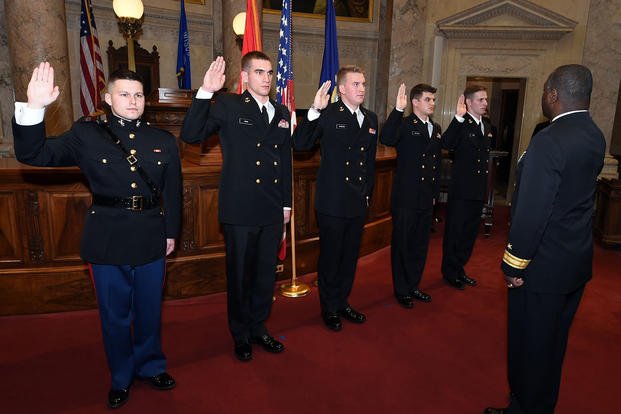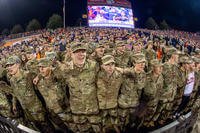The following is a list of the NROTC academic requirements:
- Complete all requirements for bachelor's degree under university rules and regulations.
- Complete certain courses specified by the Navy.
- Requirements may vary by college, but the Navy and Marine Corps highly emphasize academic success.
- Complete a normal course load required by college or university for degree completion.
In addition to a normal course load, midshipmen must follow these general academic guidelines:
- Calculus (one year by end of sophomore year) (not required for nurse- or Marine Corps-option students).
- Physics (one year of calculus-based physics by end of junior year) (not required for nurse- or Marine Corps-option students).
- English grammar and composition (one year) (not required for Marine Corps option).
- National security policy/American military affairs (not required for nurse option).
- Computer science (one year) (not required for nurse or Marine Corps option).
- Naval science course each semester.
- Weekly drill instruction periods.
- Four- to six-week training period each summer.
- Nurse midshipmen participate in summer training in accordance with their individual nursing curriculum requirements.
- Scholarship midshipmen may enroll in courses requiring five years for bachelor's degree, provided they will not have reached their 27th birthday on June 30 of the year in which they complete their fifth year and are commissioned.
- Midshipmen enrolled in five-year programs may qualify for compensations and benefits during their fifth year.
- Entitlement to an additional year of benefits is determined through a separate process after the student has been in the program for at least one year.
Students not entitled to a fifth year of scholarship benefits will be granted a leave of absence without benefits to qualify for their degrees. A leave of absence normally is scheduled for the third year, but it may be taken during the second or fourth year of the five-year curriculum.
Ready to Join the Military?
We can put you in touch with recruiters from the different military branches. Learn about the benefits of serving your country, paying for school, military career paths, and more: sign up now and hear from a recruiter near you.
ROTC related topics












